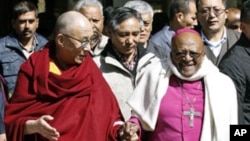Tibetan spiritual leader, the Dalai Lama, hosted South Africa's Archbishop Desmond Tutu in the northern Indian city of Dharamsala, where Tutu made an impassioned plea to China to change its policies in Tibet. The Dalai Lama on Thursday asked his fellow Nobel Peace Laureate, Archbishop Desmond Tutu, to keep Tibetans in his prayers.
"We Tibetans are passing through a difficult period," he said. "And our compassionate nature of Tibetan culture are really facing a lot of difficulties."
The Tibetan spiritual leader was referring to a months-long crackdown by Chinese forces, during which Tibetan exiles say at least six peaceful protesters have been shot in recent weeks.
The Chinese government has acknowledged killing one Tibetan it called a “rioter,” and says the protests are being carefully planned by specially trained “mobs” who have used violence against police.
Tibetans say China pursues a policy of systematically overwhelming Tibet with non-Tibetan Chinese migrants who often discriminate against them. Images of the Dalai Lama are forbidden, and many monks say they are threatened with punishment if they do not undergo nationalistic “re-education programs” that distance them from their traditional culture.
Tutu called on China to relax its grip on Tibet.
“Please, you leaders in Beijing. We beg you: allow Tibet to be what the constitution of the People's Republic [of China] permits. Autonomy.”
Tutu, a former anti-apartheid activist often described as “South Africa's moral conscience,” referred to the Dalai Lama as the “most peace-loving person on this earth.” And he urged China to allow the Tibetan spiritual leader to return to his homeland.
“God hasten the day when we will enter a free Tibet,” Tutu said.
The Dalai Lama crossed into India in 1959 after a failed uprising against China, and he was followed by tens of thousands of Tibetan supporters.
Lobsang Sangay, prime minister of the elected Tibetan Exile Administration based in Dharamsala, said he fears China's crackdown may still escalate.
“We have reports that hundreds of convoys of Chinese personnel with automatic machine guns are moving towards Tibet. With Tibetan New Year on February 22, there will be many gatherings. We fear many Tibetans might face unfortunate experiences.”
Lobsang Sangay, second right, shown during a prayer session to remember Tibetans who have died in Tibet and to show solidarity to Tibetans inside Tibet, February 8, 2011.
Lobsang spoke at a candlelight vigil this week, held to mourn at least 19 Tibetans who have reportedly lit themselves on fire in the past year to protest Chinese policies.




